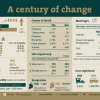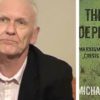028: Alice Louise Kassens on Nudging Students to Study Economics and Why Mainstream Media Should Publish Research on Mental Health
Dr. Alice Louise Kassens is an Economics Professor at Roanoke College and has already built a notable
reputation in her profession.

Alice is the current recipient of Roanoke’s John S. Shannon Professorship in Economics, which honors and supports a faculty member who is an outstanding teacher and accomplished scholar and who is thoroughly committed to enriching the lives of Roanoke students.
Dr Kassens’ work at Roanoke includes creating and maintaining an economics program blog and a biannual newsletter, Roanomics. She also serves as the faculty advisor for the College’s Economics Club.
Alice’s areas of expertise include labor and health economics. She has won several awards and fellowships, and her work has been published in numerous academic journals.
Alice is one of three economists who won Cengage Learning’s 2013 Economist Educators Best in Class Award for her method of teaching using Twitter.
Dr Kassens is president of the Virginia Association of Economics, has recently been appointed by Governor McAuliffe to his Joint Advisory Board of Economists, is a senior analyst for the Institute for Policy and Opinion Research and is a Referee for the Journal of Economic Education, the Journal of Economics and Finance Education, and the National Council on Undergraduate Research.
Alice is the author of Changing Perceptions and Waistlines – A Bayesian and Behavioral Approach and is known as the ‘Running Economist’ not because of her busy lifestyle but because she is a competitive runner.
Alice earned her bachelor’s degree from the College of William and Mary and her Ph.D. from North Carolina State University.
Personal Habits:
- Running, swimming and looking after her five dogs and an 18 year old cat!
Economic Themes:
In this interview, Alice mentions and discusses:
Supply-side and demand-side of the housing market, primary research methods, sample selection bias, surveys, employment, unemployment, the Great Recession and regression discontinuity design models.
Economists:
In this interview, Alice mentions:
Milton Friedman, Thomas Sowell, William Rogers, Mark V. Pauly, Alvin Headen, Yana van der Meulen Rodgers, Luther Lawson, Dean Baker and Jadrian Wooten.
Takeaway:
Do a little something everyday, even if it’s as simple as downloading a dataset, making an outline for a paper, talking to a colleague about a project. Do something small and all of it adds up overtime.
Find out:
- how Alice’s secrets to increasing an economics class size.
- how Alice uses social media to encourage students to learn economics more effectively.
- how Twitter can be used to remove the limitations to classroom-specific learning.
- how Dr. Kassens collects data for the Consumer Sentiment Report for Virginia.
- how to remove sample selection bias when collecting primary data.
- how to analyse unobservables using observed data.
- about the benefits of small-class sizes for learning.
- which economist Dr. Kassens would love to collaborate with.
- how being an athlete helped with a career decision to become a health economist.
- why Dr. Kassens wrote a report on gender disparities in health care in Papa New Guinea.
- about the gender disparity in depression levels upon losing a job.
- whether men or women respond better to losing their jobs by continuing to job search.
- if people lose their job because they were depressed or are they depressed because they’re unemployed?
- how Dr. Kassens’ research can help people with depression if the media can report her findings to the masses.
- if people reduce their expectations to live longer once they are diagnosed with Type II diabetes.
- if obese people who are diagnosed with Type II diabetes respond by losing weight.
- how writing a blog makes you accountable for what you do and helps you get things done.
- the importance of why organisations should make their data freely accessible to academics.
Nudging Students to Study Economics at Roanoke College
- Running Economist Blog.
- Twitter Feeds.
- Roanonomics Newsletter.
- Economics Club.
- Economics Reading Group.
- Economics Study Trip.
- Create a sense of community among Economic Students.
- Working with Advanced Placement Teachers at High School.
- Inviting High School students to Roanoke College Campus.
Dr. Kassens offers her best students the opportunity to teach economics weekly at the local Patrick Henry High School in Roanoke to help teach Mr. Hartman’s Advanced Placement Economics course. This is part of Dr. Kassens’ Service Learning Independent Study in which participating seniors are awarded academic credit for meeting the course requirements. Students teach the economics lesson plan of the day and sometimes run simulations, do group-work or show movies or tv programs like House of Cards, extracting economic concepts and themes from them. This helps reinforce the learning process both for the economic seniors and for the High School students.
To fulfil a whole credit, Dr. Kassens’ students are required to write reflective pieces based on a number of questions such as ‘What did you learn about yourself?’, ‘How do you think you’re helping the community?’ and ‘What challenges did you face?’. Dr. Kassens has identified research which shows that employers need students to be able to articulate what they learned and why their independent study or internship was important, not that they actually did one.
The Service Learning Independent Study at Roanoke College fulfils such a need. Not only does it give students the opportunity to gain invaluable experience but also prepares the student to be self-motivated, confident and above-all being able to demonstrate, in an articulate fashion, to potential employers what they have gained from such an experience.
This program is a win-win both for the senior at Roanoke College and the student at Patrick Henry High School. The senior, who is at this stage studying intermediate micro and macro, will go over principles of economics to teach the High School students. This only reinforces the learning process and makes them a more accomplished student. By reinforcing the material of principle micro and macro, the student can create a solid foundation to build upon, which will become invaluable at intermediate level economics.
Using Twitter in the Classroom to Teach Economics
Dr. Kassens uses Twitter as part of her assignments for her Principles of Micro and Macro classes. Students are given 10 different tasks to fulfil during this semester-long assignment in which they need to write and articulate an economic-related tweet based on the pre-assigned guidelines. For example, students are required to tweet about economic policy as outlined in the State of the Union address by the US President. Following this, students must then comment on or answer a question made by a fellow student. The hashtag #kassensecon122 must be used in order to keep the conversation going and for ease of tracking the students work. This can be challenging due to the limitation of articulating a tweet of up to 140 characters in length.
The students also helped Dr. Kassens in the development of a rubric so they knew how they were going to be graded. It was a short but well-defined rubric, which was important as it allowed Dr. Kassens to be responsive leading to a fast turn-around in grading results. This was considered vital since “the goal was to improve their writing”. Using Twitter to improve writing skills may, at first, appear a failed experiment but it is surprisingly “difficult to put into 140 characters something meaningful that’s going to score well on the rubric because they can’t use funny abbreviations”.
[Tweeting your way to improved writing, reflection, and community by Dr. Alice Louise Kassens]
The rubric was therefore important so that students could get feedback quickly allowing them to make improvements in their next assignment. Finding topics that Dr. Kassens believes her students would find interesting was also important. Dr. Kassens reached out to other economists on Twitter, some she didn’t know personally such as Dean Baker, and asked them to engage with her students by asking a question. Once students answered this question, Dr. Kassens sent the answers back to the economist.
The benefits Dr. Kassens found with using Twitter in assessing economics was that students’ writing skills improved as evidenced by how the rubric scoring went but “it also broke down these barriers that you have with a classroom so that they could beyond the classroom walls and interact with well-known economists”.
The semester-long project at Roanoke College is worth 20 to 25% of the students’ final grade. However, Dr. Kassens found it interesting that half of her students did not have a Twitter account. She had believed that most young kids use Twitter. This statistic seemed consistent for each of the three semesters in which the assignment was delivered. Consequently, the first week of the semester was devoted to setting up an account, informing students of how to use Twitter and sending out ‘practice’ tweets that reflects an economic argument, concept or point-of-view within 140 characters.
Using Twitter to sharpen critical thinking and writing skills by Dr. Alice Louise Kassens
Favorite Internet Resource:
Recommended Book:
- Keynes Hayek: The Clash that Defined Modern Economics by Nicholas Washout
- Economic Facts and Fallacies by Thomas Sowell
- How to Write A Lot: A Practical Guide to Productive Academic Writing by Paul J. Silvia
- Changing Perceptions and Waistlines – A Bayesian and Behavioral Approach by Alice Kassens
Where to Find Alice Kassens:
- Website: The Running Economist
- Twitter: @RnningEconomist
Podcast: Play in new window | Download
 059: Shawn Humphrey on La Ceiba Microfinance, Tribal Teaching and Creating a Culture of Commitment in the Classroom
059: Shawn Humphrey on La Ceiba Microfinance, Tribal Teaching and Creating a Culture of Commitment in the Classroom 114: Deirdre McCloskey on Equality and Greed and How To Be a Very Good Economist
114: Deirdre McCloskey on Equality and Greed and How To Be a Very Good Economist 113: Jonathan McEvoy on Globalisation, National Autonomy, Capitalism and the Economic Resonance in Timeless Songs
113: Jonathan McEvoy on Globalisation, National Autonomy, Capitalism and the Economic Resonance in Timeless Songs 083: Stephen Kinsella on Stock Flow Models, Rent Controls and Being the Green Lantern of Economics
083: Stephen Kinsella on Stock Flow Models, Rent Controls and Being the Green Lantern of Economics 067: Leigh Caldwell on Cognitive Economics and the Mathematics of Behavioral Economics
067: Leigh Caldwell on Cognitive Economics and the Mathematics of Behavioral Economics 077: The Irish Economy 100 years on from the 1916 Easter Rising
077: The Irish Economy 100 years on from the 1916 Easter Rising 079: Bryan Caplan on Parenting, the Case Against Education and the Rational Voter
079: Bryan Caplan on Parenting, the Case Against Education and the Rational Voter 032: Joe Gladstone on the ‘Pay What You Want’ Pricing Model and Using Big Data to Understand You Better
032: Joe Gladstone on the ‘Pay What You Want’ Pricing Model and Using Big Data to Understand You Better 085: Michael Roberts on Understanding Karl Marx and His Thinking on Capitalism
085: Michael Roberts on Understanding Karl Marx and His Thinking on Capitalism 021: Paul Dolan on the Economics of Happiness
021: Paul Dolan on the Economics of Happiness